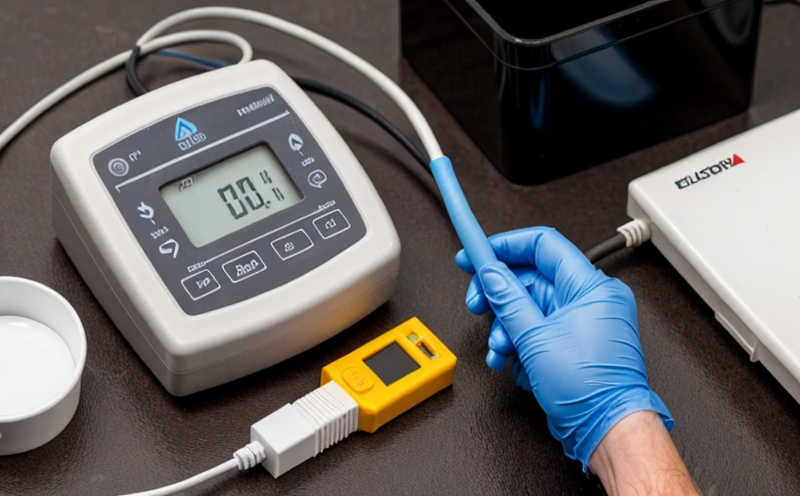IEC 61215 Electrochemical Testing of Photovoltaic Modules
The International Electrotechnical Commission (IEC) standard IEC 61215 provides a comprehensive framework for the qualification testing and certification of photovoltaic (PV) modules. This suite of standards ensures that PV modules meet stringent performance, safety, and environmental requirements. Among these tests is electrochemical testing, which assesses the corrosion resistance and long-term reliability of the metallic components in PV modules.
The electrochemical test specifically evaluates the durability of the solder joints, connectors, and other metal parts used in photovoltaic devices. This is crucial for ensuring that solar panels can withstand harsh environmental conditions such as humidity, temperature fluctuations, and mechanical stress over their expected lifespan. By identifying potential weaknesses early in the manufacturing process, this testing helps manufacturers improve product quality and reliability.
The electrochemical test typically involves submerging a sample PV module in an electrolyte solution for extended periods under controlled conditions. During this time, electrical currents are applied to simulate real-world operational scenarios. The performance of the metallic components is then assessed based on resistance to corrosion, changes in conductivity, and other relevant parameters.
Accurate specimen preparation is vital before conducting electrochemical tests. This includes cleaning the metal parts thoroughly to remove any surface contaminants or residues that could interfere with test results. Proper labeling ensures accurate tracking throughout the testing process. The choice of electrolyte solution also plays a critical role, as it must mimic the environment in which PV modules will operate while being compatible with the materials used.
Once prepared, the samples undergo rigorous electrochemical analysis using specialized equipment designed to measure various characteristics like galvanic corrosion rates and current density distribution. These measurements provide insights into how well each component resists degradation over time. Reporting these findings helps manufacturers make informed decisions about material selection and process optimization aimed at enhancing product longevity and performance.
The importance of adhering strictly to IEC 61215 standards cannot be overstated, especially when it comes to electrochemical testing. Compliance ensures not only adherence to international best practices but also enhances market credibility by demonstrating a commitment to producing high-quality solar products that meet rigorous safety and quality benchmarks.
In summary, the IEC 61215 electrochemical test is an essential tool for ensuring the durability and reliability of photovoltaic modules. By simulating real-world conditions during prolonged immersion tests, this method provides valuable data on metal component performance under various stressors. This information is crucial for continuous improvement in PV manufacturing processes.
Benefits
- Ensures compliance with international standards (IEC 61215)
- Identifies potential weaknesses early in the manufacturing process
- Improves product quality and reliability through accurate specimen preparation
- Mimics real-world operating conditions to provide reliable test results
- Promotes continuous improvement in PV manufacturing processes
- Enhances market credibility by demonstrating a commitment to high-quality products
- Reduces the risk of premature failure due to corrosion or other environmental factors
The electrochemical testing process not only meets regulatory requirements but also offers significant advantages for manufacturers. By incorporating this test into their quality assurance programs, companies can enhance product longevity and performance, ultimately leading to increased customer satisfaction and loyalty.
Eurolab Advantages
At Eurolab, we are committed to providing accurate, reliable, and efficient electrochemical testing services for photovoltaic modules. Our state-of-the-art facilities and experienced team ensure that every test adheres strictly to the IEC 61215 standard.
- Accurate Results: We utilize advanced analytical techniques and cutting-edge equipment to deliver precise results, ensuring that your PV modules meet all specified requirements.
- Comprehensive Support: Our experts can guide you through the entire testing process, from specimen preparation to final report generation. This ensures a smooth workflow for your projects.
- Industry Experience: With years of experience in photovoltaic testing, our team understands the unique challenges faced by this sector and offers tailored solutions accordingly.
- Compliance Assurance: We stay updated with all relevant standards and guidelines to ensure that your tests meet current industry requirements. This helps prevent costly delays or rejections during certification processes.
- Customer Satisfaction: Our commitment to excellence is reflected in the high satisfaction rates among our clients, who appreciate our professionalism and attention to detail.
Choose Eurolab for your electrochemical testing needs and experience the difference that expertly executed tests make. Let us help you achieve superior quality and reliability in your photovoltaic products.
Why Choose This Test
- Precision: Our electrochemical testing service employs precise methodologies to ensure accurate measurement of metal component performance under various stressors.
- Rigor: Every aspect of the test—from specimen preparation to data analysis—is conducted with rigorous adherence to IEC 61215 standards.
- Expertise: Our team comprises highly skilled professionals who possess in-depth knowledge of photovoltaic technologies and their testing requirements.
- Efficiency: We streamline the entire testing process, from initial consultation to final report delivery, making it easier for you to integrate this crucial step into your workflow.
- Cost-Effective: By identifying issues early on, electrochemical testing helps avoid costly repairs or replacements later down the line. It also contributes significantly towards reducing warranty claims and associated expenses.
- Reputation: Choosing Eurolab for your electrochemical testing needs means gaining access to a reputable laboratory that has earned a solid reputation within the industry through consistent excellence in service delivery.
The IEC 61215 electrochemical test is more than just another part of the quality assurance process; it's an investment in the future success and longevity of your photovoltaic products. With Eurolab by your side, you can be confident that every step taken towards achieving compliance with this standard will contribute positively to both short-term project outcomes and long-term business growth.





